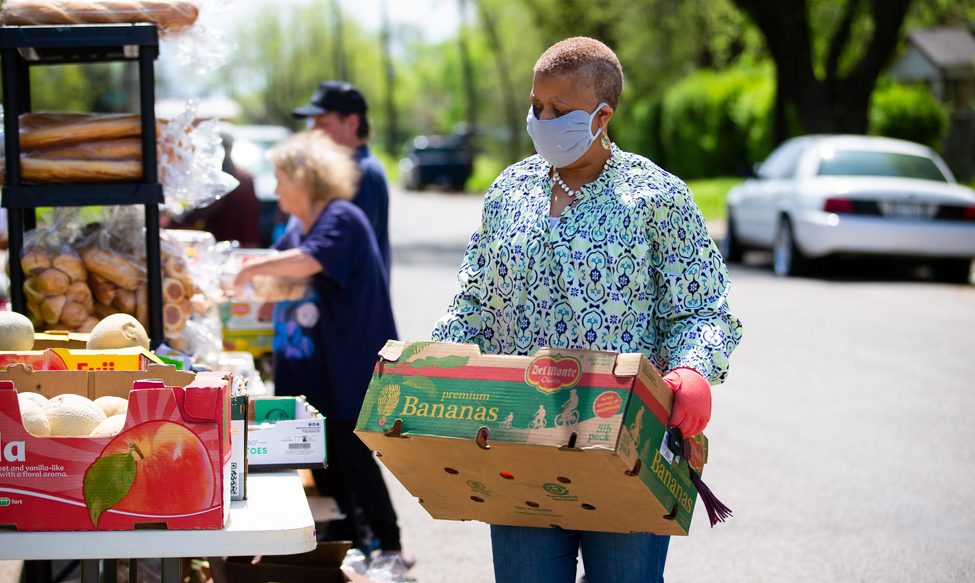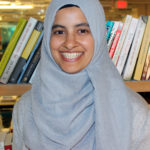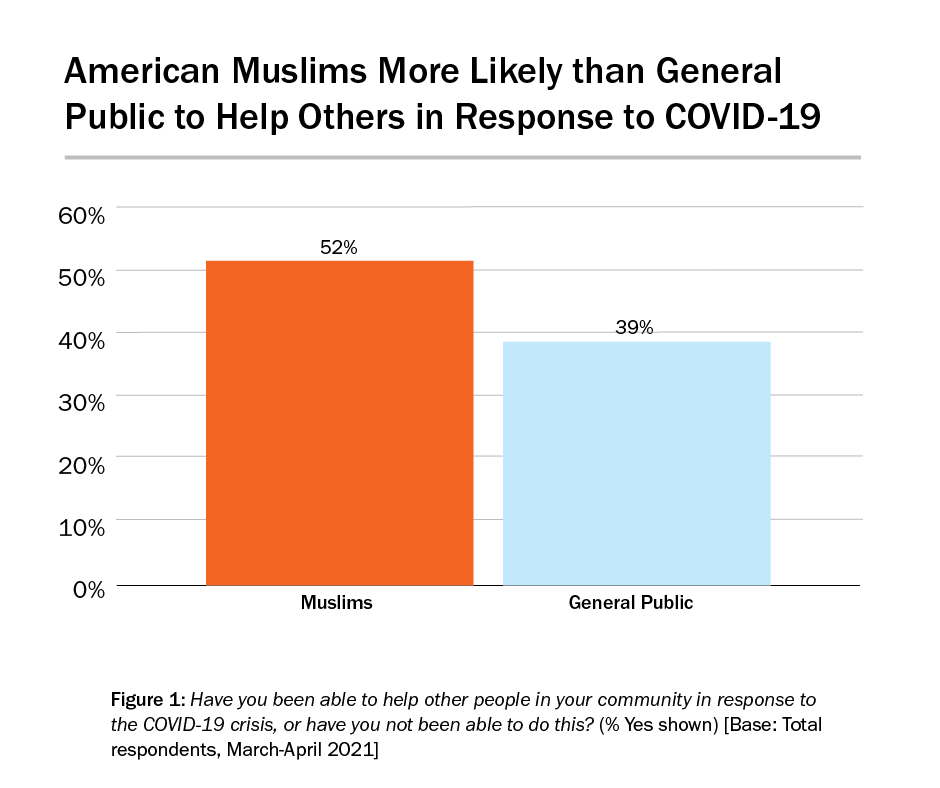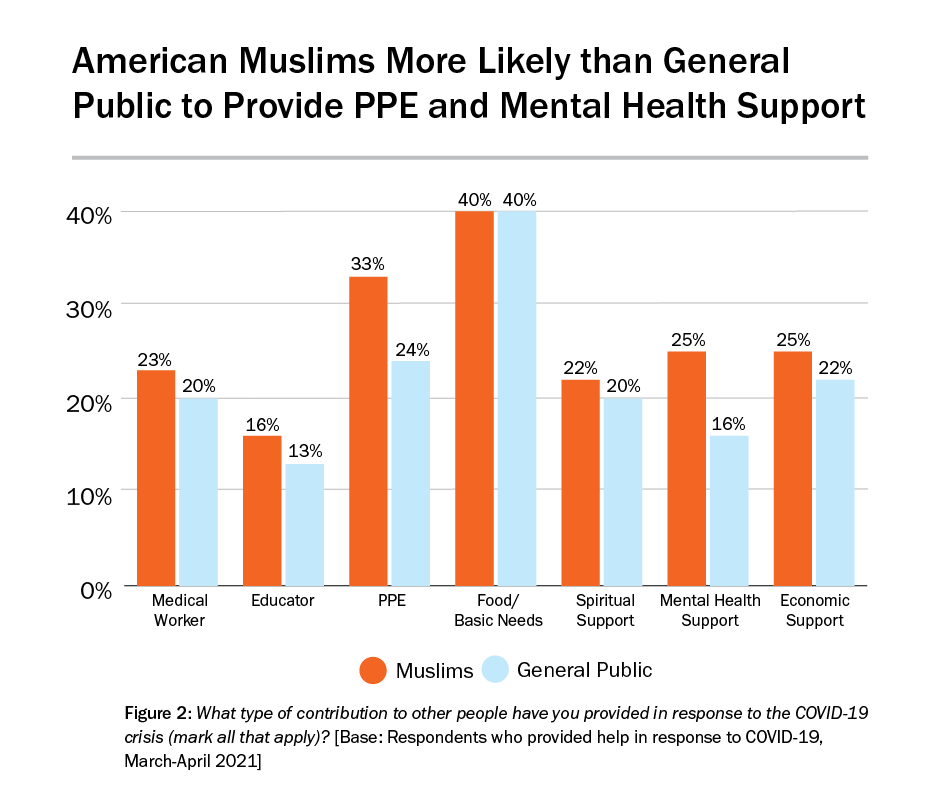
Facing COVID-19 Through Service and Contribution
December 20, 2021 | BY ERUM IKRAMULLAH
SUMMARY
More than half of American Muslims (52%) contributed to providing aid and solutions to the challenges of the pandemic, compared to 39% of the general public. Among those who contributed, American Muslims were more likely than the general public to provide PPE and mental health support.
Our nation, our world, has collectively felt the suffering, loss, and heartache brought on by the COVID-19 pandemic. In addition to the loss of life and physical and mental health impacts, the pandemic exacerbated the negative impacts of existing inequitable systems and institutions. The problems of poverty, hunger, healthcare, domestic violence and more have been magnified. In the face of these difficulties arose an opportunity: to serve and contribute to solutions.
ISPU began the project Community in the Time of Corona with a report Documenting the American Muslim Response to the COVID-19 Crisis, in which we summarized and highlighted American Muslim contributions crowdsourced between April and November 2020. In 2021, we fielded a nationally representative survey from March 22, 2021 to April 8, 2021, aiming to assess American Muslims’ experiences living for one year through the COVID-19 pandemic. The survey also provided comparisons to the general population. The full survey methodology is available here. The survey included questions about contributions made in response to the pandemic. Our analysis reveals significant findings about the role of American Muslims.

Facing COVID-19 Through Service and Contribution
December 20, 2021 | BY ERUM IKRAMULLAH
SUMMARY
More than half of American Muslims (52%) contributed to providing aid and solutions to the challenges of the pandemic, compared to 39% of the general public. Among those who contributed, American Muslims were more likely than the general public to provide PPE and mental health support.
Our nation, our world, has collectively felt the suffering, loss, and heartache brought on by the COVID-19 pandemic. In addition to the loss of life and physical and mental health impacts, the pandemic exacerbated the negative impacts of existing inequitable systems and institutions. The problems of poverty, hunger, healthcare, domestic violence and more have been magnified. In the face of these difficulties arose an opportunity: to serve and contribute to solutions.
ISPU began the project Community in the Time of Corona with a report Documenting the American Muslim Response to the COVID-19 Crisis, in which we summarized and highlighted American Muslim contributions crowdsourced between April and November 2020. In 2021, we fielded a nationally representative survey from March 22, 2021 to April 8, 2021, aiming to assess American Muslims’ experiences living for one year through the COVID-19 pandemic. The survey also provided comparisons to the general population. The full survey methodology is available here. The survey included questions about contributions made in response to the pandemic. Our analysis reveals significant findings about the role of American Muslims.
More than Half of American Muslims Helped their Community in Response to the COVID-19 Crisis
In our survey, we asked: “Have you been able to help other people in your community in response to the COVID-19 crisis, or have you not been able to do this?” American Muslims were more likely than the general public to have contributed to COVID-19 response efforts through various methods. Fifty-two percent of American Muslims contributed, compared with 39% of the general public. Among Muslims and the general public, men were more likely than women to help others (62% of Muslim men vs. 41% of Muslim women and 44% of men in the general public vs. 35% of women in the general public). These gender differences may be associated with women’s increased levels of caregiving responsibilities and invisible labor within the home during the pandemic.
Looking at contributions by age, we find that for both American Muslims and the general public, younger individuals are more likely than older individuals to make contributions. Among Muslims, 52% of 18-29 year olds and 57% of 30-49 year olds made contributions versus 40% of those 50 years old or older (51% and 44% vs. 28%, respectively, among the general public). Given the disproportionate health impacts of COVID-19 on older individuals, especially before vaccine availability, it is expected that they would be on the receiving end of help.
American Muslims Were More Likely than the General Public to Make Contributions in PPE and Mental Health Support
In our survey, we asked about what type of contribution respondents provided in response to COVID-19, with a list of several categories/types of contributions:
-
- Medical
- Educational
- Providing personal protective equipment (PPE)
- Providing food and/or basic needs
- Spiritual support
- Mental health support
- Economic support
- Other
Among those who report that they provided help in response to the pandemic, we find that American Muslims were more likely than the general public to provide PPE and mental health support. One in three American Muslims (33%) who reported providing help during the pandemic provided PPE, compared with about one in four (24%) of the general public who helped. Furthermore, one quarter of American Muslims (25%) provided mental health support, compared with 16% of the general public who helped. This finding on mental health support is significant because American Muslims are a community commonly thought to face stigma around mental health challenges, in particular due to intersectionality with respect to immigration status, race, ethnicity, gender, and class (Ciftci & Corrigan; Abbasi & Paulson). Perhaps the pandemic has provided an opportunity for Muslim mental health professionals to get their messaging out and for the community itself to be open and ready to receive such messages, as suggested by recent findings from the National Alliance on Mental Health.
American Muslims were on par with the general public in terms of contributions in all other categories we tested. The type of help provided most often, for both American Muslims and the general public, was support with food and basic needs at 40%.
These findings on American Muslim contributions are not surprising. Rather, they serve as confirmation of previous ISPU research showing how American Muslims are a vital organ, rather than a benign tumor, in the body of America. In our 2016 American Muslim Poll, we found that Muslims were as likely as other faith groups to cooperate with people in their neighborhoods to solve problems. In 2020, we found that American Muslims were more likely than other faith groups to attend a town hall meeting during the previous year. In 2018, we found that American Muslims give in charity equally to institutions within and outside of the Muslim community and that domestic poverty is the more important cause, with 81% of Muslims giving towards this cause compared with 55%-72% of other faith groups. American Muslims are also the most likely faith group to be motivated to give in charity by the feeling that those with more should help those with less.
Furthermore, American Muslims make significant impacts in their local communities in their everyday lives, as documented in ISPU research on Muslim residents in Michigan and New York City. They have risen up and contributed vital solutions during previous times of crisis, for example during the Flint Water Crisis. It is no surprise, then, that American Muslims are on the frontlines working to provide solutions to the many challenges brought on by the COVID-19 pandemic.

Erum Ikramullah is the Research Project Manager at ISPU, where she manages the day-to-day activities of the organization’s research studies. Learn more about Erum→



